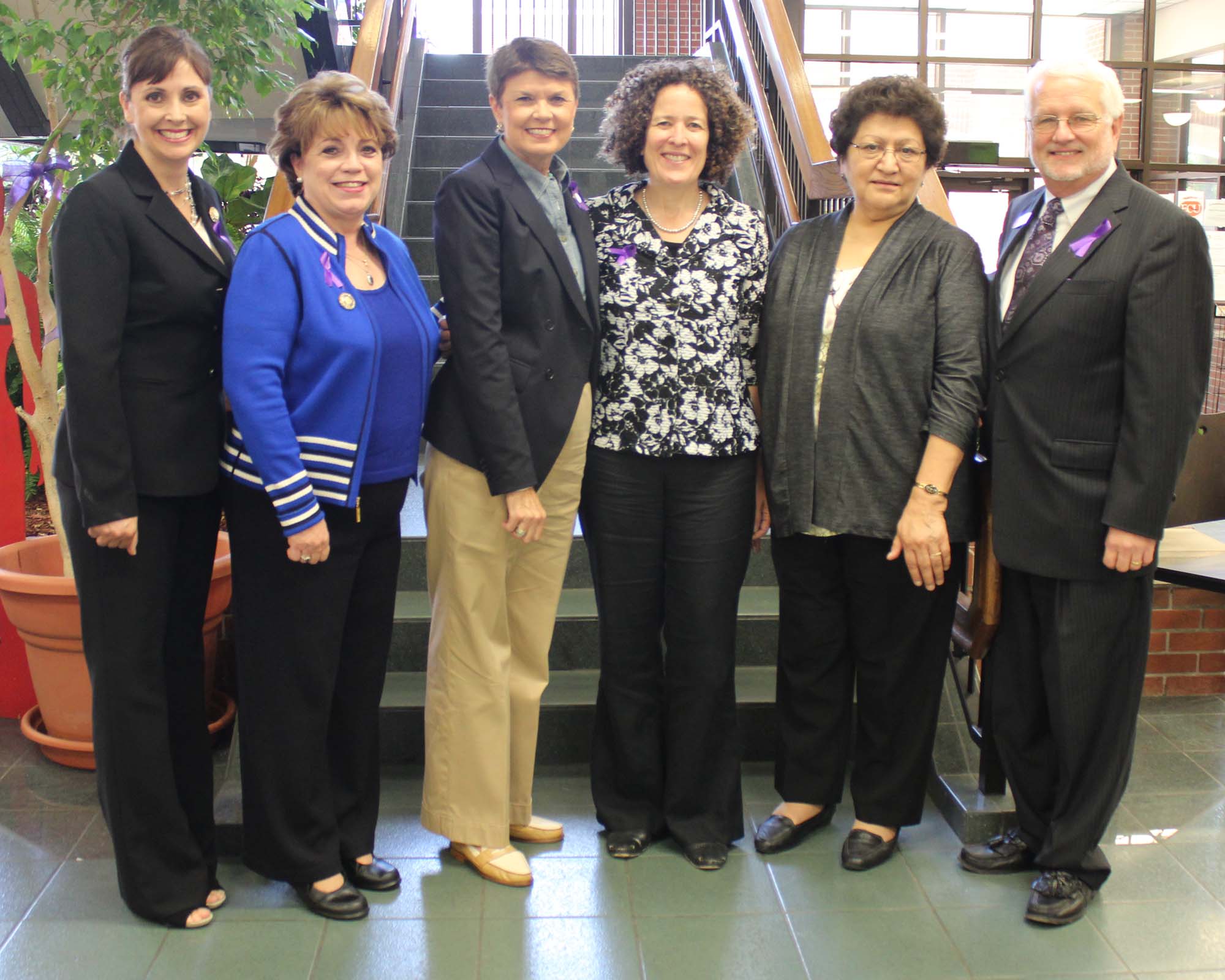Making strides, in hopes of diminishing violence against women, has been a supreme collaboration by several entities from within the East Central University community, across the state of Oklahoma, and throughout the nation.
Those successful efforts were highlighted as representatives of groups who have worked against domestic violence, dating violence, sexual assault, and stalking, came together to meet with two highly-esteemed and distinguished guests in Bea Hanson, Director of the U.S. Department of Justice Office on Violence against Women, and Lorraine Edmo, U.S. Department of Justice Deputy Director of Tribal Programs.
Both made a brief but informative visit to the ECU campus earlier this month. ECU had the opportunity to demonstrate these strong partnerships, showcase progress and share success stories.
Among those in attendance at the meeting were ECU President John Hargrave, Regent Connie Reilly, recently retired Regent Belva Howard, Dr. Gerald Forbes, Vice-President of Student Development; Dr. Katricia Pierson, Assistant Vice-President of Academic Affairs; Dean of Students Boomer Appelman; and two members of CIRCAW’s Peer Educator Program, Nikki Dickerson and Desiree Lyon, each representing the stellar administrative and board involvement and support related to ECU’s efforts and activities in the interpersonal violence prevention field.
Hanson and Edmo were making a site visit for the Regional University System of Oklahoma – Violence Prevention Project (RUSO-VPP) and the newly-implemented ECU Campus Law Enforcement Technical Assistance Program (CLE-TAP).
An overview of each grant program, along with its progress and interconnectedness was presented in the meeting conducted by Leah Lyon, Director of RUSO-VPP and CLE-TAP.
President Hargrave strongly supports and participates in many programs offered by the Office of Violence Against Women. He has pledged continued support for OVW programs and continued strong relationships and partnerships in the community, state and nation.
Regents Reilly and Howard, actively involved in the RUSO-VPP and the more recent technical assistance program, discussed their perspective on the issues and their experience with the program as well as brought significant focus to the role of college and university governing boards in the field of campus violence prevention and safety.
Also highlighted were the partnerships over the years with the RUSO Board of Regents, Oklahoma Coalition against Domestic Violence and Sexual Assault (OCADVSA), District Attorney’s Office, Chickasaw Nation, Family Crisis Center and CLEET (Council on Law Enforcement, Education and Training). Emphasized in those partnerships were the number of interpersonal violence survivors served, students, faculty and staff educated or trained, among the RUSO universities; number of officers trained by the TPTP; success of the National Summit on Campus Safety for College and University Presidents; and the campuses across the nation served at the technical assistance and training institutes.
The meeting painted a portrait of ECU’s efforts and success, substantiated by the presence of many individuals who play a key role in the continued success, and emphasized the qualitative success of the programs.
“Violence against women is a huge issue on campuses and you are a really bright light in what you have done here,” said Hanson. “I thank you for your leadership, particularly dealing with an age group in which there are high risks. Having more folks like you is the key.”
ECU’s relationship with the Department of Justice began in 2002 with the Tribal Police Training Program, and was expanded in 2004 to include the DOJ Office of Violence against Women with the grant funded formation of CIRCAW (Campus Initiative to Reduce Crime Against Women).
In 2007, after four years of successful collaboration, training and response to interpersonal violence, ECU was awarded the RUSO-Violence Prevention Project with an initial $1 million in funding to become one of only four OVW flagship programs in the nation.
ECU has served as the lead institution to the other five RUSO institutions – Southwestern Oklahoma State, Southeastern Oklahoma State, Northwestern Oklahoma State, the University of Central Oklahoma and Northeastern State – as both mentor and funder, to implement and replicate programs on campus similar to ECU’s CIRCAW.
In 2010, ECU was awarded a two-year continuation and additional funding to continue RUSO-VPP while also receiving a concurrent grant and funding to implement a law enforcement technical assistance program to OVW campus grantees across the nation.
Based on significant progress and enhanced success, ECU was recently granted an additional three years and funding in the amount of $500,000 to continue and expand the technical assistance and training activities for campuses. The technical assistance program was recently renamed the Safety Training and Technical Assistance for Administrators, Boards and Law Enforcement Campus Program (STTAABLE Campus Program).
Since 2003, ECU’s Tribal Police Training Program (TPTP) has developed, organized and conducted advanced training projects for Indian country police efforts, tribal law enforcement in Oklahoma and across the U.S. and to work with other partners on campus to provide training that integrates local and state law enforcement with tribal agencies. Additionally, TPTP works closely with CLEET and serves as an active liaison between the Bureau of Indian Affaris, Indian Police Academy, Department of Justice, CLEET and ECU. Since 2000, ECU’s TPTP has received almost $2 million in funding from DOJ offices, Bureau of Indian Affairs and other appropriations.
Through the three OVW grant programs (CIRCAW, RUSO-VPP and STTAABLE), ECU has to date been awarded almost $3.5 million in the overall effort to reduce the incidence of interpersonal violence, educate students, train officers and serve victims and survivors of domestic violence, dating violence, sexual assault and stalking.

